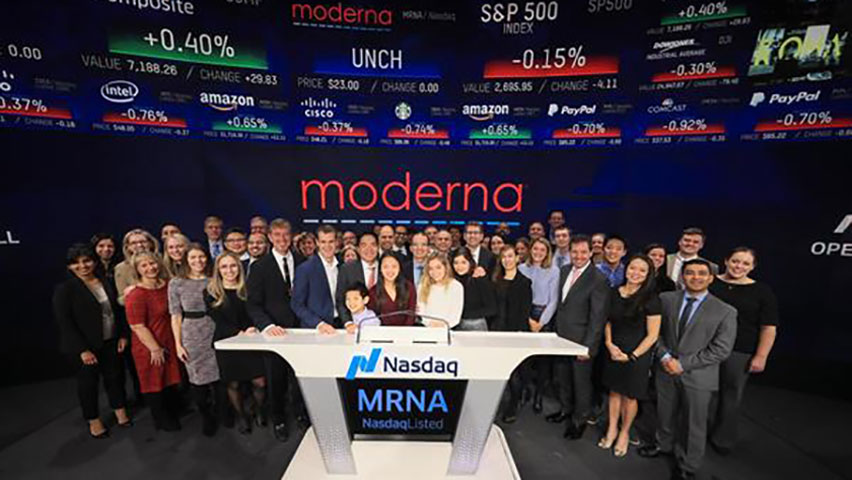Moderna shares slide after record $604m US listing

RNA drug specialist Moderna smashed the record for an initial public offering (IPO) in the US on Friday, raising a whopping $604 million, although its shares retreated 19% after the debut.
Moderna priced its offering at $23 per share – setting the value of the biotech at upwards of $7.5 billion – but by the close of trading its shares had declined to $18.60. A small after-hours recovery had the stock, which trades under the MRNA ticker symbol, knocking on the door of $19.
The IPO comes on the tail of a bumper year for biotech listings, taking the total for the year to 57, well up on the 40 or so that completed in 2017 and almost twice the average annual tally in between 2013 and 2016. A lot of those IPOs took place in the first three quarters of the year however, and there is already debate about whether the market will become less receptive to new listings in 2019.
For Moderna, the amount raised breaks all records for a biotech with no products on the market, and is particularly remarkable given that none of its projects have so far advanced beyond phase 2 clinical trials. The amount raised trounces the $324 million raised by Allogene.
The company’s technology platform is based on the delivery of messenger RNA (mRNA) to cells, hijacking their protein producing machinery to turn them into micro-factories for the production of therapeutic molecules.
It’s a largely untested principle in drug discovery and development, and Moderna hasn’t been particularly forthcoming when it comes to reporting the results of clinical trials. There are also some big scientific hurdles to vault over, including the risk of the mRNA drugs attracting the notice of the immune system, which can shut down their activity. Getting sufficient protein expression in cells to achieve a therapeutic effect is also a challenge to be overcome.
One of Moderna’s programmes – a vaccine against Zika virus – wasn’t able to generate enough protein to stimulate an antibody response in early testing but has now been replaced by an upgraded candidate.
Those obstacles haven’t stopped Moderna’s platform attracting some heavyweight partnerships, however, including strategic alliances signed with AstraZeneca in the area of cardiovascular, metabolic and renal disease drug discovery, with Merck & Co/MSD for cancer vaccines, and with Vertex to develop mRNA drugs for the genetic disease cystic fibrosis.
It will need plenty of financial resources to advance its pipeline, which currently consists of 21 drugs under development, including 10 in clinical trials and another three poised to enter the clinic.
Early-stage clinical data has been presented on lead candidate, AZD8601, which is being developed with AZ for cardiovascular diseases such as heart failure, ischemic vascular diseases and for diabetic wound healing. The drug produced a dose-dependent increase in the protein VEGF-A and changes in blood flow after intradermal administration.
Moderna isn’t the only player trying to build a position in mRNA drugs, but it certainly has the most resources behind it. Other biotechs operating in the space include Ethris – which also has a development alliance with AZ in respiratory medicine – as well as Translate Bio which also went public this year. Translate raised around $100 million from its IPO, and also saw its share track back in the aftermath of the listing.
Meanwhile, two German biotechs - BioNTech and CureVac - have entered into mRNA cancer vaccines partnerships with big pharma companies. BioNTech signed a $425 million collaboration with Pfizer in August while CureVac agreed a €1.5 billion ($1.7 billion) deal with Eli Lilly last year.












